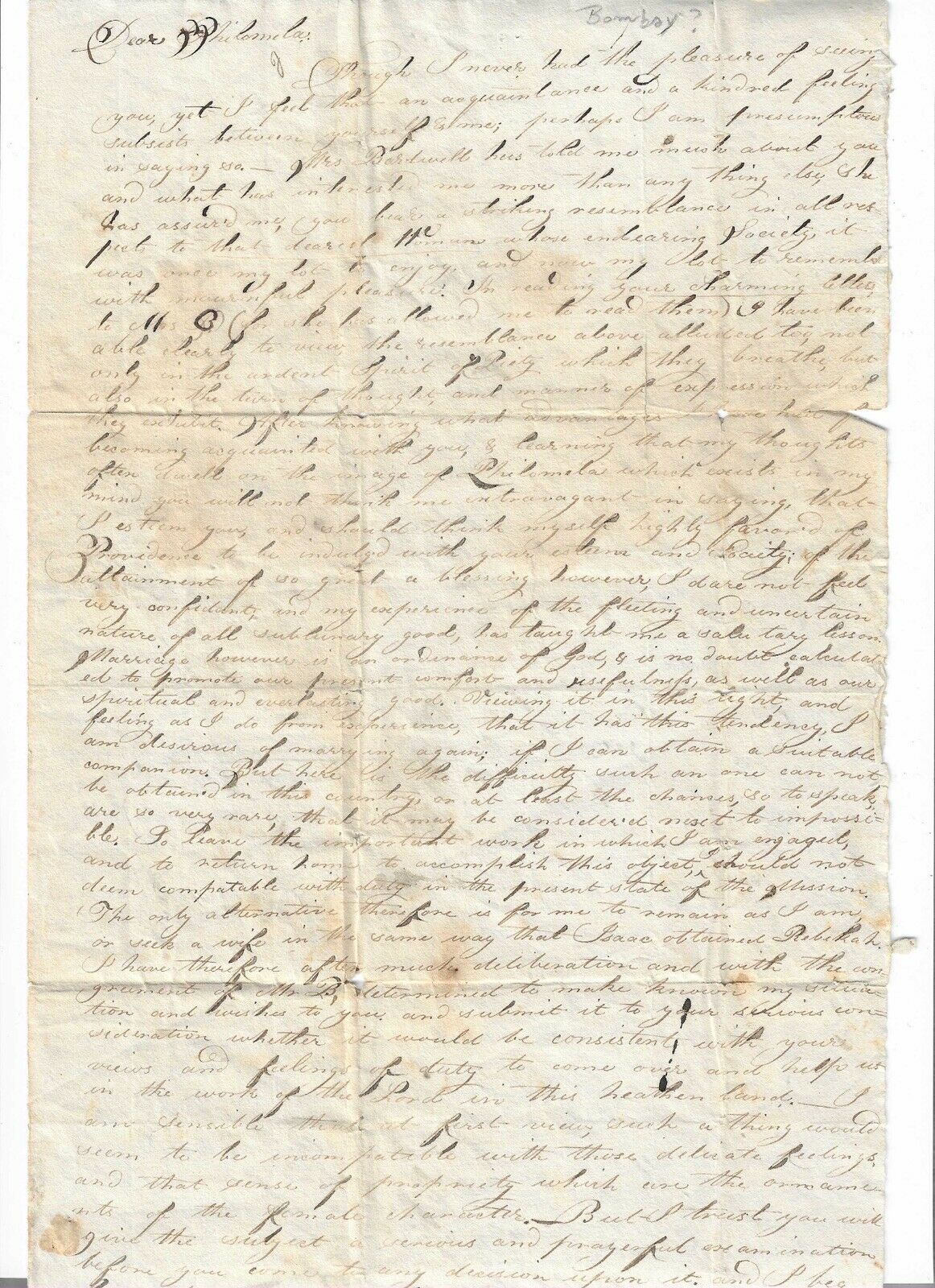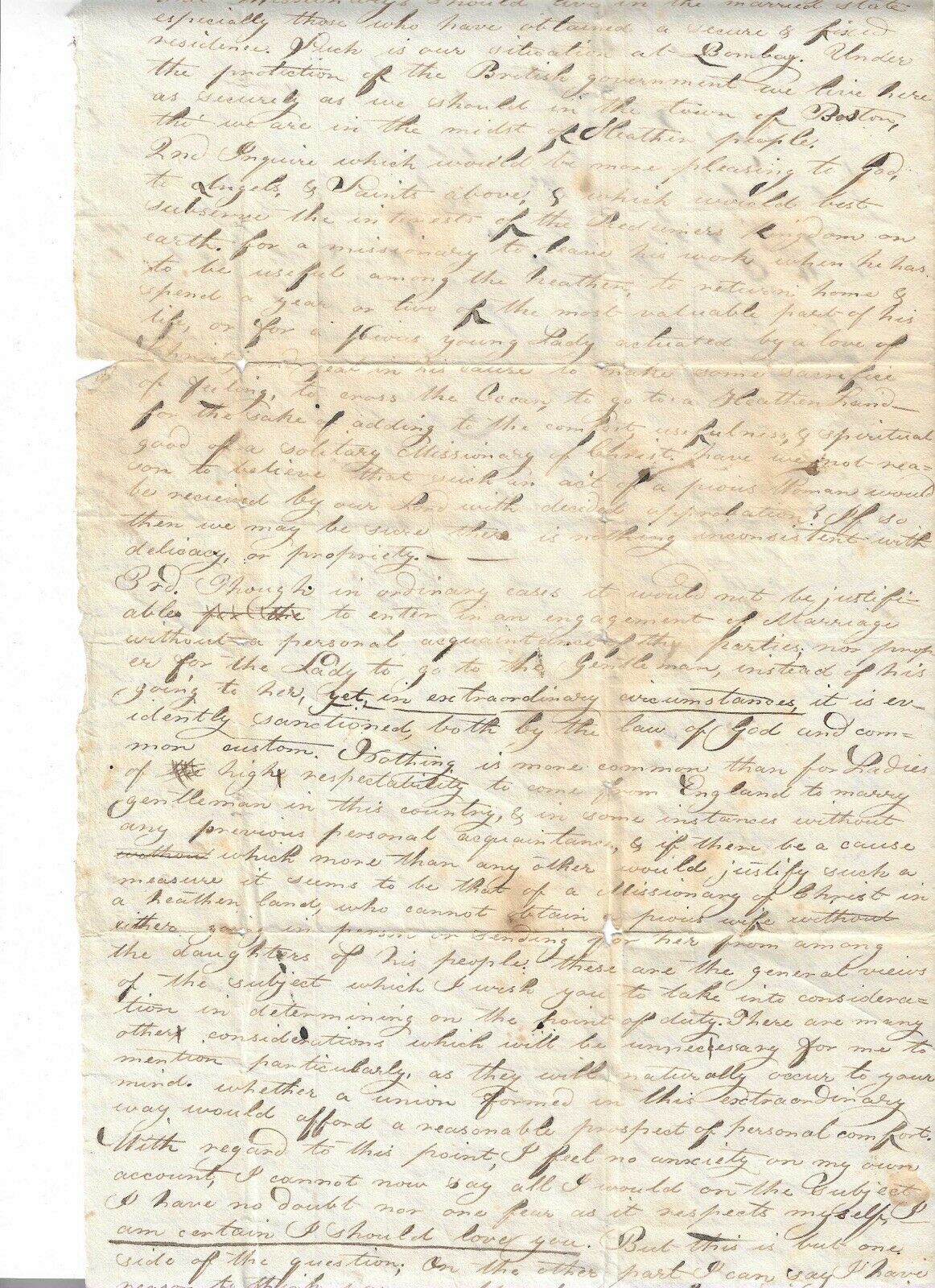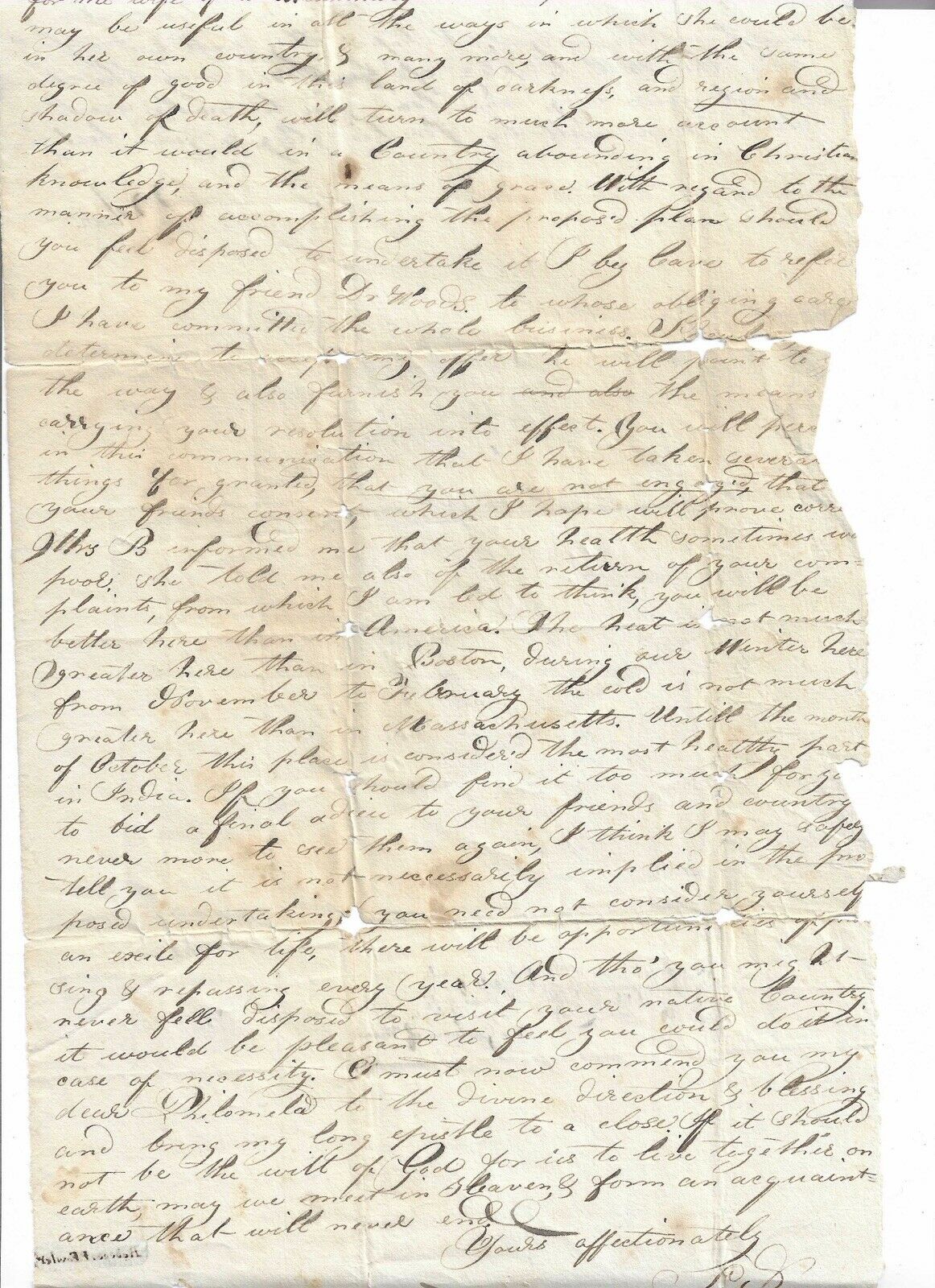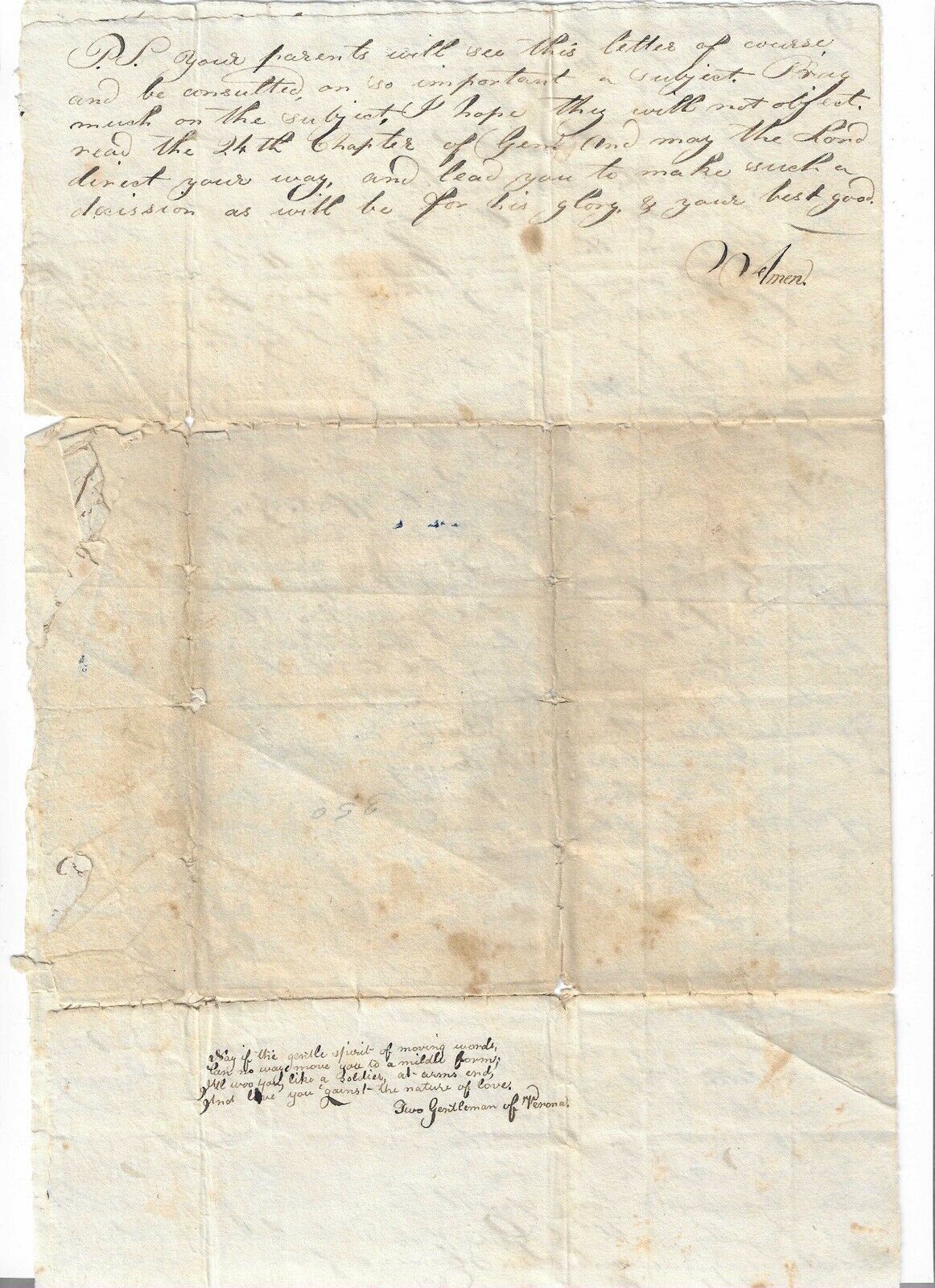Specs Fine Books
1817 ADONIRAM JUDSON / SAMUEL NEWELL. Historically Important Letter Regarding Marriage of First American Foreign Missionaries!
1817 ADONIRAM JUDSON / SAMUEL NEWELL. Historically Important Letter Regarding Marriage of First American Foreign Missionaries!
Couldn't load pickup availability
A fascinating document centered around several iconic moments and persons in the early history of American missions.
In February of 1812, Samuel Newell was ordained as a missionary of the ABCFM to India. He was not alone. At the same ordination service, preached by Leonard Woods [mentioned in the present letter], also ordained were Adoniram Judson, Luther Rice, Samuel Nott, and Gordon Hall. These would go on to become the most iconic missionaries of the early 19th century.
In the same month, February of 1812, Samuel Newell also married Harriet Atwood. She shared a deep desire to reach India with the Gospel and was, by all accounts, a singularly pious young woman. As with many women who went to India, Harriet’s life would be short. They landed at Calcutta in June, but were not allowed entry. After trying in vain to gain access, Samuel and Harriet boarded another boat for Mauritius. Having conceived en route to India, she delivered the child apparently still born on the second trip. After reaching Mauritius, Harriet also perished, making her the first American missionary to give their life on foreign soil. She was just 19 years of age.
Immediately following Harriet’s death, one of the most important missionary works in American history was published; it was a memoir of Harriet, accompanied by Leonard Woods’ sermon upon her death. As mother after pious mother read it, daughter after daughter were given the first and middle name, “Harriet Newell” in hopes that God would also call them to reach the nations of the world.
Adoniram and Ann Judson both spoke of her in glowing terms and she appears frequently in their works.
But Samuel grew lonely. From late 1812 through 1817, Samuel remained single. Samuel’s co-workers, Dr. and Mrs. Horatio Bardwell, also working in Bombay and having arrived in 1815, set about to make a match. Mrs. Bardwell had a young friend back in America who had a deep desire to come to India as a missionary, Philomela Thurston. Mrs. Bardwell urged her to consider the match and spoke of her character, godliness, and passion for missions to Samuel. At last, Samuel sent a letter, a bifolium of 4 lengthy pages, offered here, asking for her to sail to India and become his wife.
His approach is straightforward. He’s sort of, well, Mrs. Bardwell has told me about you. You seem great. I already had an amazing wife and it was good for her and I personally and spiritually. Mrs. Bardwell says you have the same character and would like to be a missionary. Maybe we could have the same thing. If you’re interested, jump on a boat to India and we’ll get married right when you get here. He addresses potential concerns about her safety, comfort, the unusual nature of the proposition, etc. but bids her consider it prayerfully since two are better than one, especially on the missionary field, since he has proven a godly husband once and she is known to a dear friend, since the cause of Christ needed him strong and comforted and also needed her, and since God has ordained marriage as good, etc.,
She arrived and they were married in 1818.
This is a truly museum-worthy piece of early American missionary history that is tied to the first missionary expedition sent from the country, the first missionary martyr, and one of the truly fascinating accounts of the costs paid and social conventions shoved aside in order for these pioneers to reach the ends of the earth with the story of the life, death, and resurrection of Jesus.
In Part:
“Dear Philomela,
Though I have never had the pleasure of seeing you, yet I feel that an acquaintance and a kindred feeling subsists between yourself & me; perhaps I am presumptuous in saying so. Mrs. Bardwell has told me much about you and what has interested me more than anything else, she has assured me you have a striking resemblance in all respects to that dearest Woman whose endearing Society it was once my lot to enjoy, and now my lot to remember with mournful pleasure. In reading your charming letters to Mrs. B. (for she has allowed me to read them) I have been able clearly to view the resemblance above alluded to, not only in the ardent Spirit of Piety of which they breathe, but also in the turn of thought and manner of expression which they exhibit. After knowing what advantages ***** *** becoming acquainted with you & learning that my thoughts often dwell on the image of Philomela which exists in my mind, you will not think me extravagant in saying that I esteem you and should think myself highly favored of Providence to be indulged with your esteem and Society; of the attainment of so great a blessing, however, I dare not feel very confident, and my experience of the fleeting and uncertain nature of all subliminary good, has taught me a salutary lesson. Marriage, however, is an ordinance of God and is no doubt calculated to promote our present comfort and usefulness as well as our spiritual and everlasting good. Viewing it in this light and feeling as I do from experience, that it has this tendency, I am desirous of marrying again, if I can obtain a suitable companion. But here is the difficulty; such an one cannot be obtained in this country, at the very least the chances, so to speak, are very rare that it may be considered next to impossible. To leave the important work in which I am engaged, and to return home to accomplish this object I should not deem compatible with duty in the present state of the Mission. The only alternative therefore is for me to remain as I am or to seek a wife in the same way that Isaac sought Rebekah. I have therefore, after much deliberation and with the congreement of Mr. B, determined to make known my situation and wishes to you, and submit it to your serious consideration, whether it would be consistent with your views and feelings of duty to come over and help us in the work of the Lord in this heathen land. I am sensible that at first view such a thing would seem to be incompatible with those delicate feelings and that sense of propriety which are the ornaments of the female character. But I trust you will give the subject a serious and prayerful examination before you come to any decision upon it. . . . .
2d Inquire which would be more pleasing to God, to Angels, & Saints above, & which would best subserve the interest of the Redeemer’s Kingdom on earth, for a missionary to leave his work when he has to be useful among the Heathen, to return home & spend a year or two of the most valuable part of his life, or for a pious long lady actuated by a love of Christ and ***** in his cause to make some sacrifice of feeling, to cross the Ocean, to go to a Heathen land for the sake of adding to the comfort, usefulness, & spiritual good of a solitary Missionary of Christ. Have we not reason to believe that such an act of a pious woman would be received by our Lord with decided approbation? If so, then we may be sure there is nothing inconsistent with delicacy or propriety. . .
3d Though in ordinary cases it would not be justifiable to enter into an engagement of marriage without personal acquaintance of the parties, nor proper for the Lady to go to the Gentleman instead of his going to her, yet in extraordinary circumstances, it is evidently sanctioned, both by the Law of God and by common custom. Nothing is more common than for Ladies of high respectability to come from England to marry gentlemen in this country, and in some instances without any previous acquaintance, and if there by any cause which more than any other would justify such a measure it seems to be that of a Missionary of Christ who cannot obtain a pious wife without either going in person or sending for from among the daughters of his people.
These are the general views of the subject which I wish you to take into consideration in determining on the point of duty. There are many other considerations which it will be unnecessary for me to mention, particularly as they will naturally occur to your mind. Whether a union formed in this extraordinary manner would afford a reasonable prospect of personal comfort. With regard to this point, I feel no anxiety on my own account. I cannot now say all I would on the subject. I have no doubt nor one fear as respects myself. I am certain I should love you. . . .
With regard to the manner of accomplishing the proposed plan, should you feel disposed to undertake it, I beg leave to refer you to my friend Dr. Woods, to whose obliging care I have committed the whole business . . .
If you should feel it too much to bid a final adieu to your friends and country, never more to see them again, I think I may safely tell you it is not necessarily implied in the proposed undertaking; you need not consider yourself an exile for life. There will be opportunities for repassing every year. And tho you might never feel disposed to visit your native Country, it would be pleasant to feel you could do it in case of necessity.
I must now commend you my dear Philomela to the divine direction & blessing and bring my long epistle to a close. If it should not be the will of God for us to live together on earth, may we meet in Heaven and form an acquaintance that will never end.
Signed Samuel Newelll.“
The letter was published in 1878 and can be read in its entirety here, beginning on page 378.
Four page bifolium ALS in generally good condition. Pages 3 & 4 edge worn making catchwords slightly difficult to decipher, though not affecting meaning. Folds are similar.
Share








